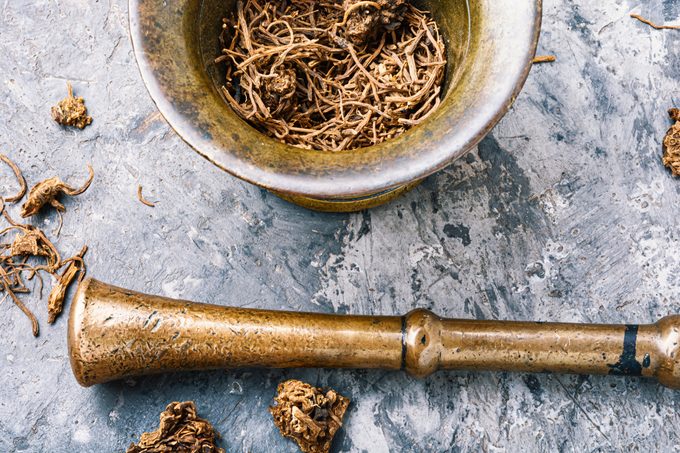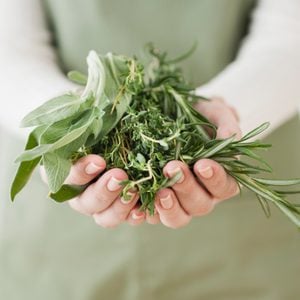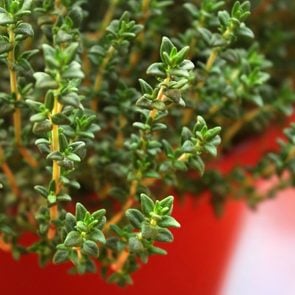14 Things Experts Need You to Know about Valerian Root
Updated: Mar. 08, 2022
Valerian root is touted as an herbal sleep aid, and the herb may provide other health benefits. But is it actually safe?
Our editors and experts handpick every product we feature. We may earn a commission from your purchases.
What is valerian root?
Plenty of folks struggling to sleep have reached for this traditional herb in the hopes it would lead the way to dreamland.
Valerian root is available in supplement form, and the herb is supposed to help you sleep better. It’s also been increasing in popularity, and market forecasters expect sales to grow continue to increase, according to a report by market research company 360 Research Reports. But is it really effective, not to mention safe?
“Valerian (Valeriana officinalis) has been used for thousands of years, most notably for insomnia,” says Marvin Singh, MD, triple board-certified gastroenterologist, director of integrative gastroenterology at the Susan Samueli Integrative Health Institute at UC Irvine and founder of The Precisione Clinic outside San Diego.
When taken as a supplement, liquid extract, or as a raw herb in tea, valerian provides relaxation benefits.
In research, valerenic acid—an active ingredient in valerian root—slows the breakdown of an amino acid called gamma butyric acid (GABA) in the brain, says Mona Dan, an herbalist, acupuncturist, and specialist in Chinese Traditional Medicine. GABA inhibits brain activity, says Dan. “The result is a feeling of calmness and relaxation.”
Here, everything you need to know about valerian root.
(Plus, here are easy ways to sleep better.)
Origins of valerian root
While valerian is still something of a novelty in America, it’s more established elsewhere.
“There are about 200 different species of valerian all over the world,” says Dr. Singh. “It grows in northern temperate climates and also in South Africa and the Andes; it is found in many parts of Europe as well. It has also naturalized in parts of the United States.”
Valerian is relatively easy to grow, and is grown by either using seeds or dividing roots, says Dr. Singh.
Dan says the root and plant stems are the parts used for medicinal purposes. “The primary medicinal components are found in its root.”
(Try these 10 healing herbs and spices.)
Different forms of valerian root
“Valerian roots are used in dietary supplements. Dried roots can be prepared as teas and dried plant materials and extracts can be put into capsules or pressed into tablets,” says Susan Bowerman, RD, senior director, Worldwide Nutrition Education and Training at Herbalife.
According to Dr. Singh, there are numerous forms valerian can be used in. “Valerian can be used in many different forms such as a tea, capsule, extract, or tincture,” says Dr. Singh.
“It is felt to be safe for most people, although you should always consult your physician before using it. It is also felt not to be habit-forming,” he adds.
“The root of the Valerian plant is processed for the extracts and oil,” says Dan. “You can find the extracts in supplements, oils and the raw herb can be used as a tea as well.”
(These are the supplements and vitamins doctors take every day.)

Valerian root’s benefits
Valerian root is touted for its benefits associated with sleep, menopause, and other health conditions. However, studies on its effects are limited and the results can be inconclusive. Further research is needed to validate it for human use.
Some of the benefits are better established than others—here are some promising findings.
Better sleep
Love a cup of warm tea before bed to help with sleep? You’re in luck. Valerian might be a natural fit.
Dr. Singh says that valerian is most popular for its sleep-aid purposes.
“The main uses for valerian include anxiety and insomnia. In many parts of Europe, it is used as a sedative.”
He explains that the herb contains valerenic acid and valerenol, two compounds that bind to GABA-A receptors. “GABA is an important neurotransmitter and it a common target of drugs used to treat anxiety and/or sleep disorders,” he says.
Studies point to its potential. A 2020 study published in the Journal of Evidence-Based Integrative Medicine found that valerian may stimulate the release of GABA, a neurotransmitter in the brain, which decreases nervous system activity for a calming effect.
But the same study points out the use of valerian for sleep has been inconsistent. “The quality of valerian supplements and content of active ingredients may be highly variable,” Bowerman explains.
“The exact constituents of valerian that help to induce sleep are unknown and there is no scientific agreement on its mechanism of action; the activity may be due to not one compound, but the interaction of multiple compounds found in the plant,” she says.
(These sleep aids may actually be hurting your sleep.)
Promote feelings of relaxation
If you’re feeling extra stressed these days, you’re not alone: Living under the threat of the coronavirus has taken its toll.
“There are multiple compounds in valerian root that can be beneficial to sleep and stress,” says Erin Palinski-Wade, RD and author of Belly Fat Diet For Dummies, citing antioxidants that have sedative effects that enhance sleep.
“Animal research has found valerian helps to maintain serotonin levels during sleep, which is important since low levels of serotonin can negatively impact mood and increase the risk of insomnia,” Palinski-Wade says.
(Try these herbs that can help ease stress.)
Ease menopause symptoms
Hot flashes, night sweats, insomnia, irritation. If you’re going through menopause, you’re likely looking for something to help make it more bearable.
Wondering if valerian root might be that answer? From a scientific standpoint, the jury’s out, though valerian shows some promise.
“There is some literature to support that valerian in combination with lemon balm, another relaxing botanical, could be useful in helping menopausal women who are having problems with sleep,” says Dr. Singh, referencing a study in Complementary Therapies in Clinical Practice.
And if you’re suffering through hot flashes, Dan says, valerian could potentially help. One study from 2013 found that menopausal women gained symptom relief from valerian. The researchers concluded that the root could be an option for women reluctant to try hormone therapy.
(Check out these natural remedies for menopause.)
Avoid valerian root for Parkinson’s
A neurodegenerative disorder that targets movement, Parkinson’s disease strikes nearly one million people in the United States.
A treatment would bring relief to many—and valerian has tempted some.
Not so fast, say experts. Not only is the data on Parkinson’s and valerian thin, but taking valerian could possibly interfere with common Parkinson’s prescription treatments.
“The data on valerian in Parkinson’s disease is not very robust,” cautions Dr. Singh.
“There is one older study from 2009 suggesting that it might have neuroprotective effects. There may also be a concern that valerian could possibly interact with other drugs commonly prescribed for those with Parkinson’s disease, so this should certainly be considered with caution in this population.”
Be sure to talk with your doctor first before supplementing or substituting any medications you take.
Risks or side effects
Like many herbs, valerian can have common side effects. Here are some risks or side effects to look for, according to our experts.
Upset stomach
Palinski-Wade says, “Valerian root can cause stomach upset, headaches, and mental fogginess in some individuals. Vivid dreams may also be a side effect.”
Restlessness
“One possible minor side effect that some people might experience from using valerian is restlessness,” explains Dr. Singh. “Others might rarely experience a hypersensitivity reaction, as might potentially happen with any new treatment or herbal therapy.”
Drug interactions
And before you go taking valerian root willy-nilly, it’s important to consider if you’re taking any medications and ask your doctor about interactions with them.
Dan cites benzodiazepines such as Valium and Xanax as examples of drugs that may not be safe to mix. “Alcohol, sedatives, and benzos may have contra interactions with Valerian root, as they have sedative qualities.”
Poor quality sleep
And Bowerman notes that, although valerian is generally considered safe and well-tolerated, the sleep it may help induce isn’t necessarily going to be high-quality.
“Some people report feeling sluggish in the morning after taking it,” she says.
“Since it slows down the central nervous system, it shouldn’t be combined with other medications or natural products with similar effects, and its use should be discontinued two weeks before a scheduled surgery involving anesthesia,” she adds.
Proceed with caution
If you do decide to try valerian root, go slow, work with your doctor, and pay attention to the dosage. Also, women who are pregnant or nursing and children younger than three years old should avoid the stuff altogether. The effect of this herb on these populations has not been thoroughly studied to recommend.
Be careful if you decide to try valerian root, says Dr. Singh. “Generally speaking, caution should be taken in combing valerian with other sleep aids and sedatives as the combined effect might be more than desired and could potentially be dangerous.”



